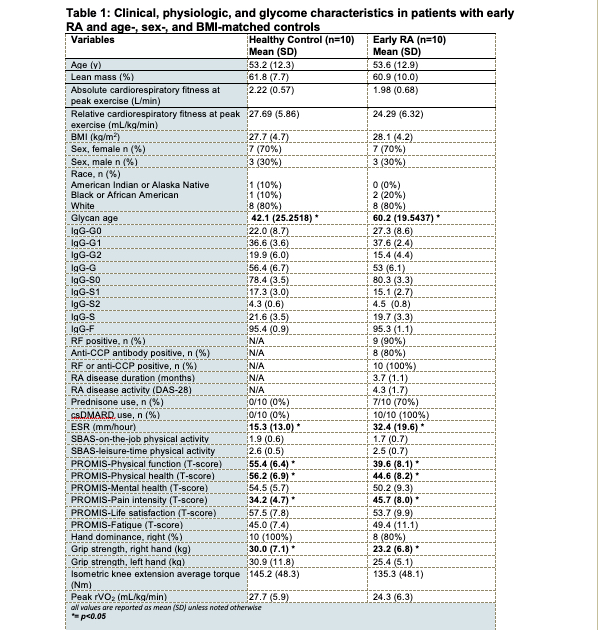Session Information
Date: Sunday, October 26, 2025
Session Type: Abstract Session
Session Time: 4:00PM-4:15PM
Background/Purpose: Glycosylation is a post-translational enzymatic process important for protein function. Glycosylation patterns range from anti-inflammatory to inflammatory, and have been used to derive a measure of biologic age, the Glycan age (GlycAge). In patients with rheumatoid arthritis (RA), the immunoglobulin G (IgG) glycome is characterized by decreased galactosylation, possibly reflecting RA immune dysfunction. Our goals were to identify 1) alterations in the IgG glycome in patients with early RA (symptom duration < 6 months), 2) changes in glycome following a supervised lifestyle modification in older RA patients with overweight/obesity, and 3) associations between RA glycome and clinical and physiologic parameters.
Methods: IgG glycome was analyzed using ultra-high-performance liquid chromatography (GENOS) and plasma samples from two recent studies: 1) MusculRA: early RA (n=10) versus age-, sex- and BMI-matched healthy controls (n=10); and 2) SWET-RA: older, established RA with overweight/obesity (n=20), randomized to 16 weeks of remotely supervised weight loss and exercise training or lifestyle counseling. Group differences and post-intervention changes were evaluated using t-tests and Wilcoxon tests, depending on data normality. Participants with RA from MusculRA and SWET-RA studies were combined (n=29; one participant completed both studies) to analyze associations between glycome with clinical and physiological parameters using linear regression, controlling for age and sex. Relationships between parameter changes following SWET-RA study lifestyle intervention (n=20) were assessed using Spearman’s correlations.
Results: As compared to age-matched controls (mean age=53.2 years), early RA (mean age=53.6 years) had a GlycAge corresponding to 18.1±22.6 years older (p=0.03) (Table 1). Early RA GlycAge was not significantly different from older, established RA (mean age=66.65 years; p=0.32). RA GlycAge was negatively associated with cardiorespiratory fitness (VO2 peak, mL/kg/min; beta=-1.66, p=0.005) and lean mass (kg; beta=-1.77, p=0.004). Baseline IgG digalactosylated glycan (IgG-G2) was positively associated with log lean mass (beta=17.9, p=0.008) and right hand grip strength (beta=0.16, p=0.04), and negatively associated with log CRP (beta=-1.05, p=0.02) and ESR (beta=-0.06, p=0.02). While diet and exercise lifestyle intervention did not significantly alter overall RA GlycAge (mean GlycAge percent change=1.7±7.9, p=0.34; Table 2), reductions in GlycAge associated with increases in lean mass (Spearman rho=-0.46, p=0.04).
Conclusion: Changes in the RA glycome occur early in the RA disease process, leading to almost two decades of biological aging via GlycAge. Our findings suggest the IgG glycome and GlycAge may be useful as biomarkers for RA diagnosis and longitudinal monitoring. Lifestyle interventions targeting improvements in cardiorespiratory fitness and muscle health may positively impact the glycome and biological aging linked to RA.
To cite this abstract in AMA style:
Hashmi S, Andonian B, Ahern M, Bennett W, Sudnick A, Johnson J, Krishnan S, Huffman K. IgG Glycome In Early Rheumatoid Arthritis Differs From Matched Controls and Links Less Lean Mass to an Early Aging Phenotype [abstract]. Arthritis Rheumatol. 2025; 77 (suppl 9). https://acrabstracts.org/abstract/igg-glycome-in-early-rheumatoid-arthritis-differs-from-matched-controls-and-links-less-lean-mass-to-an-early-aging-phenotype/. Accessed .« Back to ACR Convergence 2025
ACR Meeting Abstracts - https://acrabstracts.org/abstract/igg-glycome-in-early-rheumatoid-arthritis-differs-from-matched-controls-and-links-less-lean-mass-to-an-early-aging-phenotype/


.jpg)